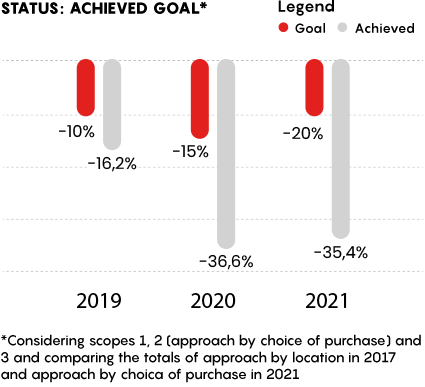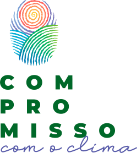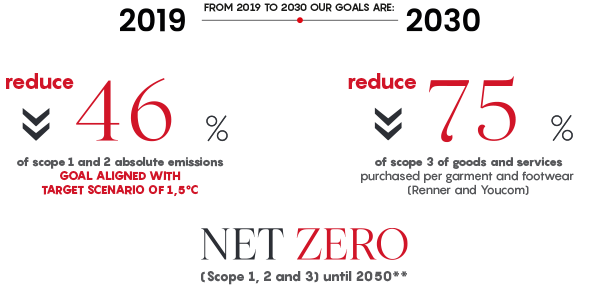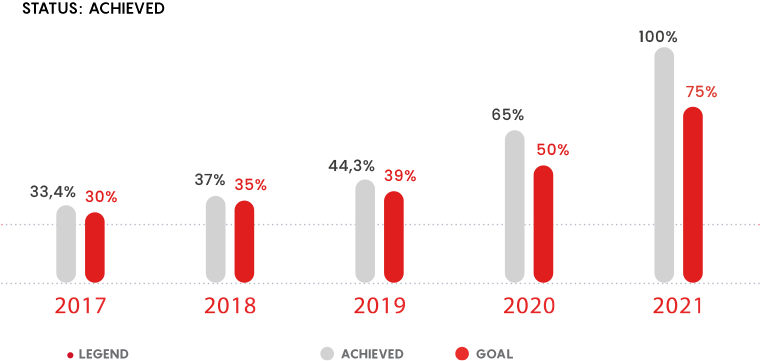Biodiversity
We put into practice our commitment to preserve biodiversity and ecosystems and to fight deforestation on two main fronts: raw materials and conservation and restoration projects.
We have goals that involve accelerating changes in our business model for a more responsible fashion, and our main challenge is linked to the reduction of emissions from the value chain in the coming decades.
We have been conducting our emissions inventory since 2010. In 2018, we made a public commitment to decrease absolute corporate CO2 emissions by 20% compared to the 2017 base year by 2021. To achieve this goal, we are working on energy efficiency gains in our own operation and logistics operations. The result was a 21.8 % reduction, exceeding the target.


Is part of B3's Carbon Efficient Index (ICO2)

Responds voluntarily to the Carbon Disclosure Project (CDP) questionnaire

Publishes GHG emissions inventory with Gold seal of the GHG Protocol program (https://registropublicodeemissoes.fgv.br/participants/505).

Is an institutional supporter of the Compromisso com o Clima Program

Joined the letter from the Brazilian Business Council for Sustainable Development (CEBDS) for Carbon Pricing;

Is committed to the Business Ambition for 1.5o C campaign of the UN

Joined the Fashion Industry Charter for Climate Action commitment, of the United Nations Framework Convention on Climate Change Framework Convention on Climate Change (UNFCCC)
In 2021, we submitted to the Science Based Targets Initiative (SBTi) our Scope 1, 2, and 3 emissions reduction target for 2030, which was approved, and we launched our Net Zero 2050 commitment.


* Target aligned with target scenario well below 2°C.
** We are committed to the quest to be NET Zero by 2050, but this goal has not yet been submitted to SBTi for approval
Learn more about our progress plan in line with the Task Force on Climate Related Financial Disclosures (TCFD)
• Transition to low-impact renewable energy use throughout the supply chain.
• Energy efficiency throughout the supply chain.
• Continue to use less impactful products.
• Continue with low-impact renewable energy use.
• Work with equipment and refrigerants with lower GWP.
• Promote continuous gains in logistical efficiency.
Lojas Renner S.A. carried out a study of the compliance of the climate strategy with the guidelines of the Task Force for Climate Disclosure (TCFD), identifying opportunities for improvement and outlining a progress plan for the next two years on the four TCFD fronts. Click the button below to find out more.
We work to reduce our energy consumption, with increasingly eco-efficient stores, efficient logistics, and the use of renewable energy and low-impact sources.
By 2021, we reach 100% of corporate energy consumption from renewable and low-impact sources – solar, wind, small hydroelectric plants (SHP) I-REC renewable energy certificates (International REC Standard), 44% of our energy consumption comes from energy on the free market and 1% comes from solar farms.

In 2021, we will invest in the construction of a wind farm in Tacaratu (PE) by Enel, which will power 170 stores and our new distribution center.
We have one LEED silver certified store, as well as our headquarters and two gold certified stores. From the learnings with these stores, since 2015 we have adopted premises, concepts and criteria for stores with sustainability standards.
With the Energy and Asset Management Project, we adopted the best technologies in automation, lighting, and air conditioning, for efficiency gains in Renner’s stores.
In the six years of the Project, we invested R$9.8 million and achieved automation in 39% of Renner stores, 11% at Ashua, 6% at Youcom, and 4% at Camicado and one of the towers of our headquarters. In 2021, we will move forward with the implementation of automation at Camicado, Youcom, and Ashua satellite stores.
of the supply chain suppliers use renewable energy (not derived from fossil fuel sources, such as coal).
of the participants in Rede Responsável have low-impact renewable energy (wind, solar, and SHP "small hydroelectric power plants").
We put into practice our commitment to preserve biodiversity and ecosystems and to fight deforestation on two main fronts: raw materials and conservation and restoration projects.
• The cotton and viscose used in the manufacture of our products must have certification that attests to good socio-environmental practices, including those related to the preservation of biodiversity. We have already reached 99.15% of cotton and 93.1% of viscose certified
• We invest in planting cotton according to the principles of agroforestry regeneration agroforestry, supporting biodiversity
• We support, since 2021, the REDD+ Jari/Amapá project, which promotes the forest conservation and biodiversity, protecting 65,980 hectares and promoting forest management in an area of 121 thousand hectares
• We promote the reuse of industrial waters, reducing the consumption of water and release of methane
• We have been supporting the Voluntary Forest Restoration project since 2018, that promotes forest density in the antiqueira region for preservation of the local flora and fauna